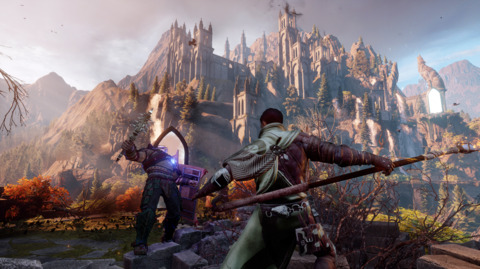
Dragon Age: Inquisition has a complicated legacy. It didn’t have a firestorm of controversy based on a single element, like Mass Effect 3’s ending, and even took home a decent amount of Game of the Year awards. But hindsight—and the release of the similar and even better-received Witcher 3—have exposed its flaws.
In short, Inquisition was great for hanging out with monster-killing buddies and doing plot missions, but its open-world felt too big and tacked-on. 25 hours worth of quest missions and Skyhold hangouts were generally great (although the main plot offered diminishing returns thanks to a too-simplistic villain), but then there were 50-plus hours of wandering around empty spaces picking herbs and fights. It was almost like there were two games—the fascinating, fandom-ready game of emotion and color and humor and tragedy, and a half-baked open-world RPG lacking all the emotion and choice of the rest of the game.
That’s too complex a web for Trespasser, the DLC ending for DAI that BioWare released late last year, to transcend in the same way that “Citadel” became the must-play true emotional ending of Mass Effect 3. But it’s still quite good, in ways that both accent the best of Inquisition and limit many—though not all—of its weaknesses. With that in mind, it’s worth looking at what makes Trespasser interesting—and how it fixes Inquisition’s mistakes while setting up the future of the Dragon Age franchise. It’s probably worth saying that I need to spoil some of DAI in order to talk about what works in Tresspasser and what doesn’t.
BioWare has found itself in the odd position lately. They’ve been needing to salvage otherwise well-received games with final expansion packs. The need for this is somewhat understandable—BioWare makes games that are ambitious in story and space, and aim for both mechanics and emotional depth. They’re big and they’re messy, essentially, and downloadable expansions gives them the opportunity to clean up their messes.
For Mass Effect 3, the mess was relatively simple to clean up: its ending was controversial, in large part, because it went for lore and ignored the characters who were the main draw for many of its players. Citadel ended up being the perfect capstone, throwing a party for almost all of its beloved companions. So how does Trespasser work?
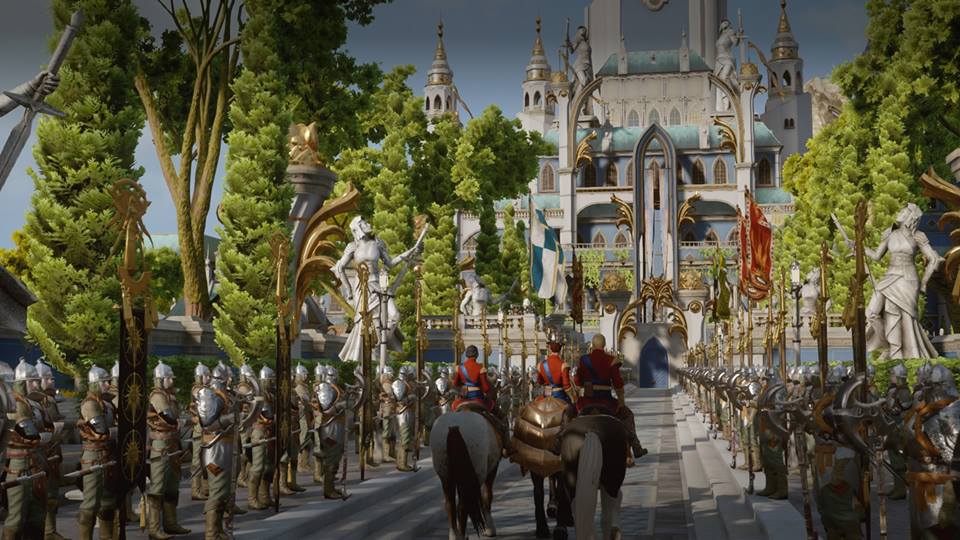
Trespasser is small
The best way to dislike Dragon Age: Inquisition early on was to stay in the first open-world zone, the Hinterlands (it even became something of a meme). The game’s big open zones were filled perfunctory quests and exploration spots, almost none of which added depth or complexity beyond “something more to do.” In contrast, the plot missions were tight, with consistent driving momentum and well-designed battles.
Trespasser gets that and runs with it. Structurally, it’s a handful of roughly 45-minute missions, interspersed with hangout time at the base. As a full game, this might be lacking (Dragon Age doesn’t need to turn into Mass Effect 2), but for a four-hour expansion, it works. We get well-designed linear levels, direct engagement with plot, and space for talking with characters—all of which are DAI at its best.
It’s about the Inquisition
One of the more frustrating elements of DAI was how its characters consistently told you that your choices would determine that nature of the powerful new institution of the Inquisition—but no matter what you did, the storyline was superficial. “Here’s the bad guy, he’s really strong, but if we work hard and make friends, we’ll beat him. Okay, we beat him and everyone loves us.”
What few choices are scattered throughout the non-plot sections of Inquisition were mostly supposed to reinforce the idea that you’re shaping the Inquisition to exist as a major continuing player in the world of Dragon Age, even after the world-threatening catastrophe was dealt with. As the Inquisitor sits in judgment, doling out forgiveness for enemies or punishment for long-past crimes, there’s an implication that these have consequences. But a political reckoning never arrived in the straightforward march to victory—just a couple of ominous emails from the War Room.
Trespasser sadly doesn’t get into the details of those decisions, but it does focus on the question of the Inquisition’s purpose in peace time.. Each of your advisors and party members has an opinion on the subject—and it builds to a dramatic and surprisingly nuanced choice. Trespasser gives the Inquisition meaning to its world outside of the simple story of the main game.
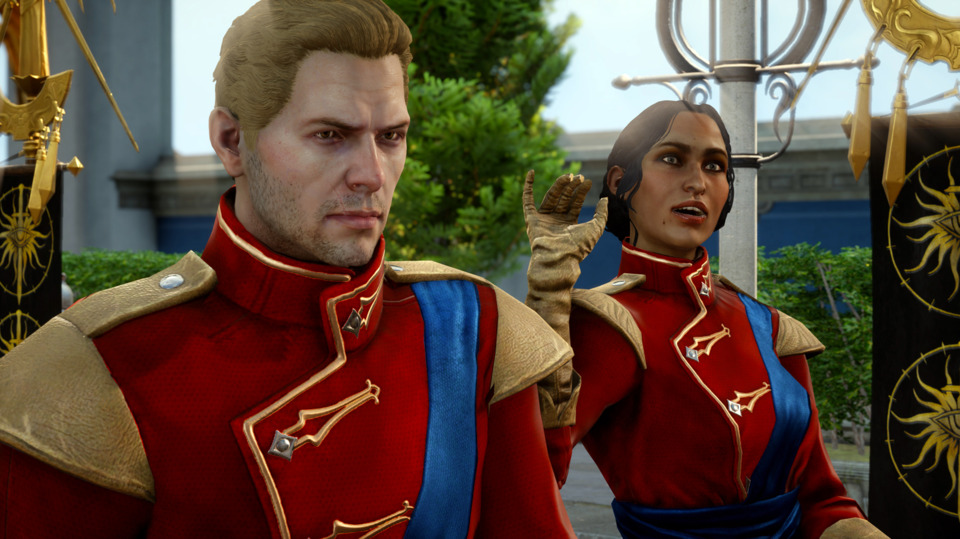
It focuses on the characters
One of the first quests you get—although optional—is to talk to each member of the Inquisition. Each of them (except the one who leaves at the end of DAI) gathered for the events of Trespasser and wants to fill you in on what’s happened. Best of all, there’s no real filler to this—everyone’s in a relatively constrained space, and they all have new dialogue at the same time, so you don’t need to talk to everyone in order to find the one person with a new conversation. The quest zones are also dense with both background conversations and opportunities to have direct private chats.
Essentially, if you, like me, see the best of Inquisition as party interactions, Trespasser engages directly with that—even with the one missing party member. Speaking of...
There are actual villains
While most of the quest levels in Dragon Age: Inquisition were well-designed, the game increasingly suffered from a dramatically inert villain, Corypheus. He was evil and powerful, you had to become powerful to stop him and...you did. He was boring, and so was his story. This was all mitigated slightly by an ending that revealed that there Corypheus was just a puppet, and one of your trusted party members was the real antagonist.
That character gets a starring role in Trespasser which is quite welcome, but they’re not alone. There’s also a more direct threat—a mysterious Qunari incursion that may or may not be a full invasion. The entire expansion is tinged with mystery: what are the Qunari doing? Will the Inquisitor find out about the betrayal that the audience saw at the end of Inquisition? Politically, will the people saved by the Inquisition turn on it and destroy it? All these give Trespasser tremendous forward momentum, like DAI had at its best.
With that said Trespasser still seems to be saving its best stuff for the next Dragon Age. The twists at the end of Inquisition and the revelations of Trespasser all do a wonderful job of setting up a complicated, sympathetic, powerful villain for the next game. But it’s frustrating to have played so long for what is, essentially, an advertisement for a future installment. It’s somewhat like post-credit sequences on Marvel movies, promising something amazingly cool at the end of a competent story, and having that dominate the discourse.
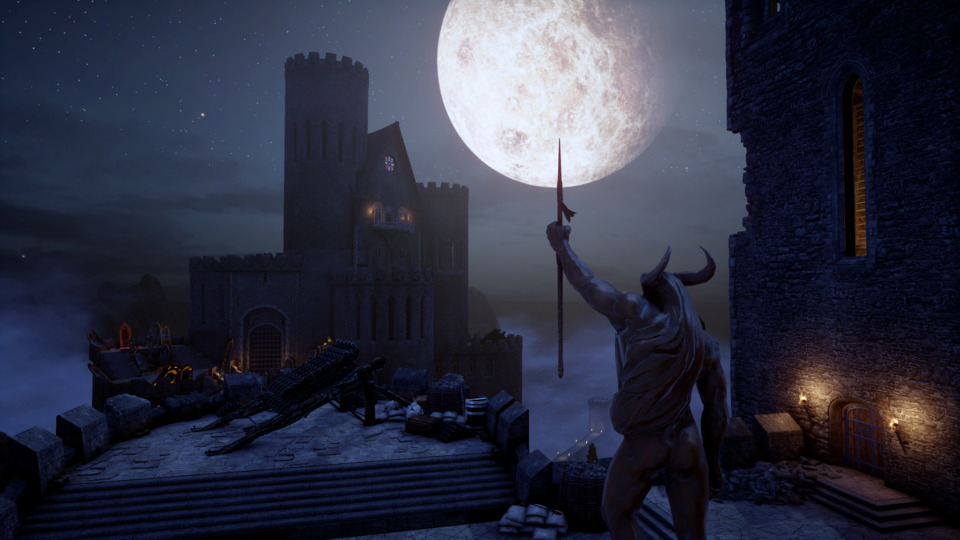
The “teaser” aspect of Trespasser may be a mix of positive and negative, but in a couple respects, it, unfortunately, reflects the worst aspects of Inquisition:
Itemization remains a mess
In practical terms, one of the biggest issues with Dragon Age: Inquisition was that inventory management and equipment progression was both confusing and annoying. Its crafting system was surprisingly good, but managing building new equipment, finding loot, and buying items from stores, across ten different party members involved far more work than reward.
Trespasser tries to simplify this mess, but ends up showing the core problems faster. The main issue is that its enemies are hard—they’re balanced for characters who’ve played all the other expansions, and have that gear. I didn’t, and got crushed. I’d beat Inquisition on Hard relatively easily, but jumping into Trespasser forced me (frustratingly, since I’d played the entire original game on Hard) to drop down to Casual. The alternative is going through the lists of materials and recipes that Trespasser provides and working with what’s available for every character you want to use—a chore that goes against the streamlined, character-focused strengths that Trespasser otherwise directly engaged in.
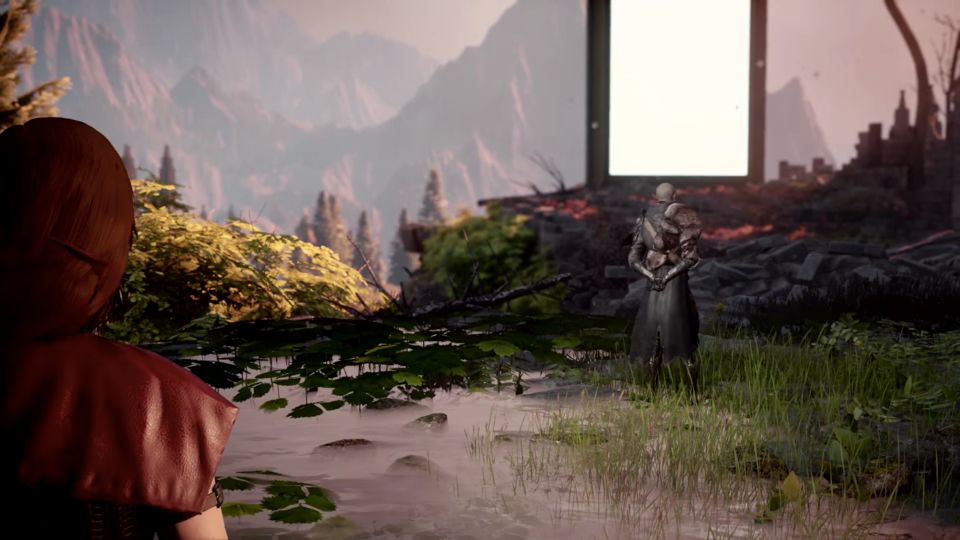
Trespasser does tragedy wrong
One of the oddest aspects of Dragon Age: Inquisition was that, unlike the previous two games in the series, it was largely lacking in tragedy. In Origins, you can save Ferelden, but you cannot fix it entirely, and you fight off total disaster after total disaster, trying to salvage something from them. Dragon Age 2 was even more explicit: Kirkwall was fucked, and through that lens it was clear that so were all of the institutions surrounding the mages and the templars throughout Thedas.
Inquisition’s biggest tragedy occurs before the game even starts, and kills characters we never knew nor cared about. But the strangest thing about it was that it had a huge, traumatic, tragic choice—but only for a rare combination of specific decisions imported from previous games. Most players would cheerfully move along, unaware of the screams of a hapless minority of players.
Trespasser doubles down on that, rather shockingly. There is a tragic moment of unexpected betrayal—but only if you made choices like a jerk in the main game. In almost all ethical choice systems that video games have installed since the original Fallout popularized the model, games have focused on the unintended consequences of choices. Try to integrate the ghouls and bigots in Fallout 3? Leads to a massacre. Help Merrill with her magical quest in Dragon Age 2? Also a massacre.
Meanwhile, Telltale has made an entire subgenre based on moving away from the “nice/jerk” choices of other games. They want choices to be difficult. And so did BioWare, in almost all of their other games. So why is Inquisition and Trespasser so unwilling to push all of its players into those uncomfortable and tragic situations?
This may be Inquisition’s legacy. There’s great stuff in the game, but it consistently struggled to prioritize those things. Trespasser does a good job of making sure the final taste of Dragon Age: Inquisition is a smooth one—but it doesn’t change what Inquisition is--a too-careful attempt at open-world popularity unsuccessfully combined with an emotional, character based-core. I hope, for future Dragon Ages’ sake, that the series can get this balance right.
Rowan Kaiser is a freelance writer focused on video games and television living in Oakland, California. Follow him on Twitter @rowankaiser for unimportant musings on pop culture and politics and very important cat pictures. You can listen to Rowan and Austin chat about games like Darkest Dungeon, and Dragon Age on the most recent episode of Giant Bomb Presents.